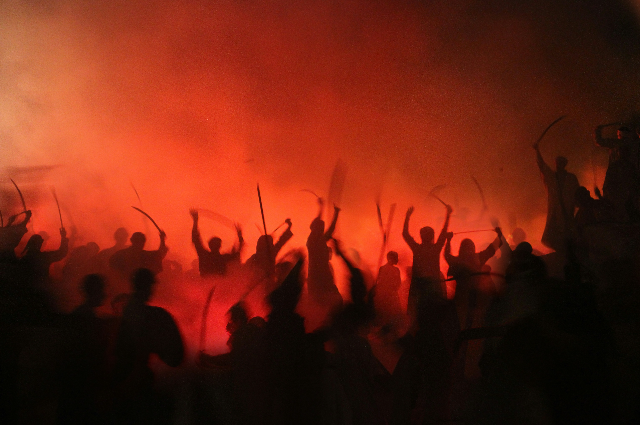
Photo by Hasan Almasi on Unsplash
Evolution of war
In the Palaeolithic age, primitive men used various weapons like blades, harpoons, bows, and arrows to fill their appetite and to defend themselves from animals. The evolution of humans and the emergence of various civilizations led to development in human ecology. It brought about a change in the way they thought, felt, and acted. One civilization wanted to be more powerful and dominant than the other. This feeling led to the first war in history, called the Sumer-Elam war around 2600 BC. The Sumerians attacked Elam as it remained an important geographical strategic location to the Sumerians. The same ideology was followed before by empires, then kingdoms and now in countries.
As time passed, wars became a part of nature and various inventions and discoveries have added fuel to the fire. For instance, the discovery of nuclear fission in 1938 by physicist Albert Einstein led to the invention of atomic bomb. This was misused in the second World War by the United States with the dropping of ‘Little Boy’ and ‘Fat Man,’ that led to the destruction of Japanese cities Hiroshima and Nagasaki. This biggest repercussion of World War II can be felt in those provinces even till today.
Causes of War
The enormous diversity of methodological, theoretical, and epistemological perspectives on polemology (the study of war) makes it difficult of providing a concrete assessment about war. However, the fundamental or primary causes of war can explain why war occurs in politics or at any moment. Many historians, analysts, diplomats, and scholars trace war to be a part of biological instincts, frustration, fear and greed, the existence of weapons, and similar factors. War pertains as the military, diplomatic, philosophical, social, political, psychological, or economic dimensions of human conflict. Yet, there is no glory in battle worth the blood it costs.
A View and Aftermath about Wars
If we have a closer look at wars, there can be three pure types- Absolute war, Instrumental war, and agonistic fighting. Absolute war designates untrammelled violence with the outmost efforts to defeat the enemy decisively, Instrumental war aims to gain access to values which the enemy controls and agonistic fight is a contest between opponents who delight in measuring their strength according to certain conditions or limitations. The effects of war include physical and long-term psychological harm to the populace. We have many instances of places where land, water, food, including fresh air were scarce because of war. War not only threatens human survival, but also challenges human values and ethics. Generations are affected with hopelessness, despair, and disabilities. Loss of life is one of the most tragic consequences of war. Trace back the history we can see how Germany and USA were affected by the Great Economic Depression in 1929 as a repercussion of World War I. Though USA won the war, it had to suffer economic losses. This is an example that tells us that there are no winners in war.
Revolution and War – Two Sides of a Coin

Photo by Hugo Jehanne on Unsplash
CARNATION REVOLUTION 1974
If we look at our own Indian history, we feel that we started the First War of Indian Independence. I would rather say it as the revolution of Indians for Independence. Indians had not started the literal ‘war’ as what we think. It was a revolt against the oppressive rule of the British East India Company. The same inference can be drawn for the French Revolution too. One can revolt against something wrong and one can immediately start a war for what they feel they want. A revolution can be peaceful and non-violent like that of the Carnation Revolution of 1974 but a war can never be peaceful. A purposeful revolution is necessary to change the existing obsolete situations. These citations give us a clarity that revolution and war are two different ways of dealing with the same situation.
The Art of War
Ethical principles cannot be applied to war but it is sometimes necessary for one’s own need for resources. Though war is always observed from a negative perspective, it is both an art and a science. Sun Tzu, a famous military philosopher has given his perspective about this through the book, ‘The Art of War’. He mentions, “The supreme art of war is to subdue the enemy without fighting and supreme excellence consists of breaking the enemy’s resistance without fighting. He also mentions important strategies and situations as predictions for victory and other essential details. So according to me, true victory in a war is achieved by defeating the enemy and not by destroying the enemy.
Today’s World and War Solutions
Past events of the history have given us and understanding about how destructive can wars be. Now, each country aims to be progressive with its resources and at times depends on its allies for facilities which they lack. There is a mutual understanding between nations and there are not many aggressive wars. However, the fact to be accepted is that greed for wealth, power, and the zeal to be the supreme is every individual’s agenda. This situation might even be the calm before the storm. In today’s world, war will not take place with armies, weapons, or armaments. Wars will only be disguised in different forms like Bio wars, Trade Monopoly, Aerial Warfare, Electronic Warfare and so on. Today’s international law enforcement, arms control and diplomacy have prevented the outbreak of wars.
Beyond these essential strategies, the roots of war must also be addressed. It is true that the religious texts which humans believe have a nuanced approach to war. They also accept the reality and necessity of war, but do not valorise the violence and carnage that accompanies war. These texts condemn any wars that go against moral duties. They mostly advocate eliminating such wars and teach us the value of peace. Peace always serves as a vital source for better economic outcomes, measures of well-being, inclusiveness, and desirable environmental performance. Citizens must always be ready to question any rationales given for war, and the fourth pillar of democracy, i.e., the press must exercise eternal vigilance in reporting on these rationales. We as humans, must foster a culture of dialogue, understanding and empathy. Thus, by embracing peaceful negotiations and non-violent means, we can lay the foundation for sustainable peace and avert the devastating consequences of lacking development and coming back to square one with irrecoverable destructions.
